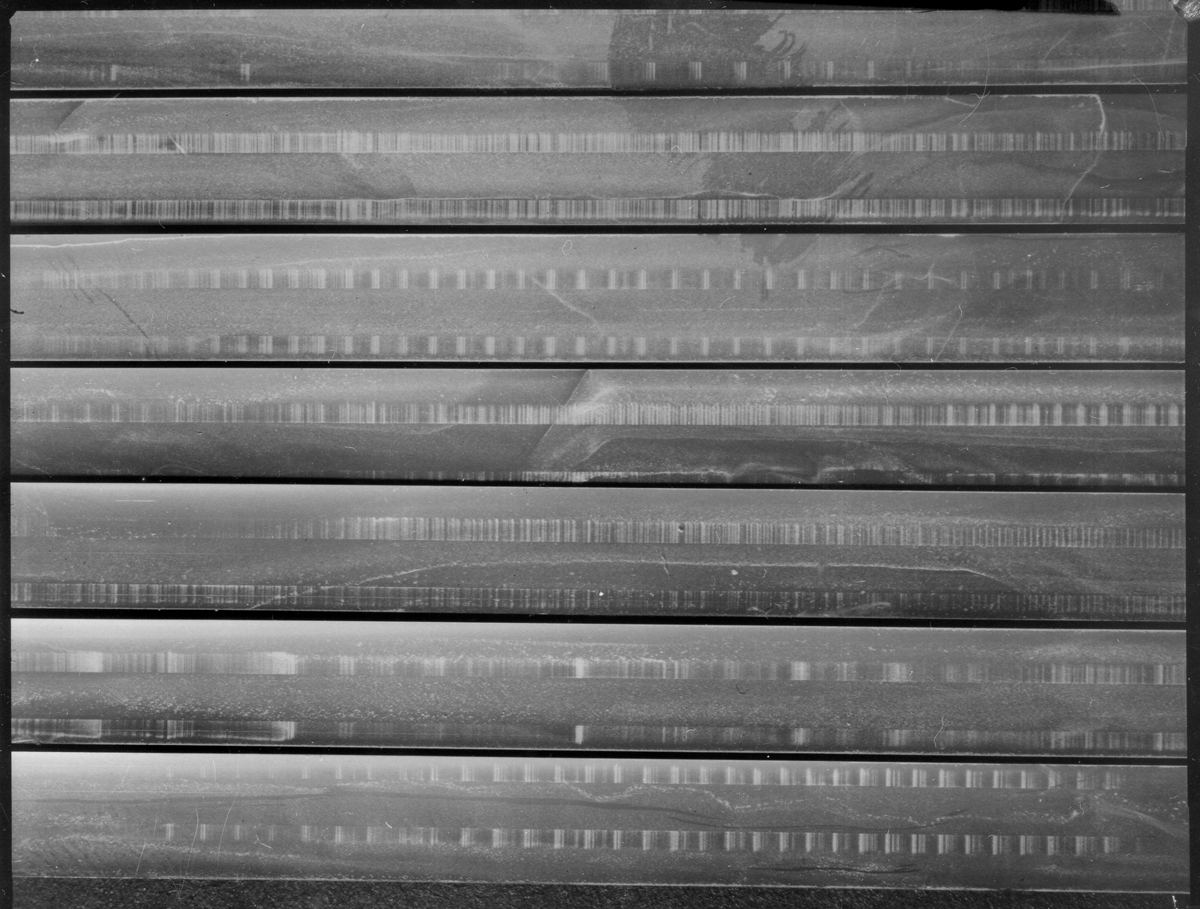
A Brief History of Widémouth Tapes & other relevant rants
brought to you by their sponsor:
Widémouth Tapes is a label that includes 3 series of audio tapes & 1 of video tapes (or, as I prefer, vaudeo &/or vaudio). The 3 audio series are the founding one: Widemouth; its successor: démo; and the most recent one whose name combines the previous 2 names & creates the overall umbrella term: Widémouth. Periodically, WdmU publishes samplers from groups of previous tapes. As such, démo K7D is the Widemouth Sampler; Widémouth tape #002 is the démo tapes sampler; & Widémouth tape #020 is currently planned to be the sampler for the 1st 19 WdmU tapes. [As of 2013, that's not the case. Maybe #30 will be the WdmU Sampler.] Widemouth Tapes was originally called such as a reference to Widemouth jars since they're also known as Mason jars - making a pun off of the founder's name: Chris Mason. I was involved basically from the beginning thanks to my being Widemouth's 1st reviewer.
Below are the introductory notes to the Widemouth Sampler:
"Widemouth Tapes was founded in the later half of 1978ev in BalTimOre, as a part of the Merzaum Collective, by writer/performer/etc Chris Mason. The Merzaum Collective included such sub-units as the performance group "CoAccident", the publishers of "pod" books & "e pod" magazine, the music group "Svexner Labs", "Desire Productions", etc.. The name "Merzaum" was contructed by combining the dadaist Kurt Schwitters' "merz" with the Russian futurist Alexei Kruchenykh's "zaum". This combination was meant to be expressive of the collective's political & lingual historical sympathies. Of particular interest to most members of the collective were sound & visual poetry, "language-centered" writing, improvising, & alternatives to capitalism & hierarchies - such as through collaboration.
The 1st 8 Widemouth tapes, all produced by Chris, were fairly clearly aligned with Merzaum activities - 5 were directly from members & the remaining 3 were by people supported by it &/or supporters of it. Steve Benson, eg, came from California, staying with Mason, to perform & read as part of Desire Productions' "Festival of Disappearing Art(s)"; while cris cheek came from London & stayed with Kirby & Ro Malone, other collective members/founders, to also perform & collaborate extensively - again sponsored by Desire Prods.
The next 4 tapes were produced, at Chris' request, by an entity going by the name "tENTATIVELY, a cONVENIENCE" - a collaborator/activist with another BalTimOre grouping with social concerns similar to those of Merzaum's. This grouping, sometimes known as "Balti-Media" (mainly in retrospect), was involved with catalyzing anarchic interaction within large groups of people who probably never would've come into contact with certain esoteric theory & practice otherwise. The 3 dominant areas of their activity were a sort of guerrilla "theater" done under the names of B.O.M.B. (the BalTimOre Oblivion Marching Band) & Crab Feast, large open-ended social events (such as "fashion shows", parties for people from the future, a sort of "fake" science fair, etc), & a network of interactive phone stations known as the B.U.T.N. (BalTimOre Underground Telectropheremonic Network). The 1st of these latter was "TESTES-3". This phone station received as many as 150 calls daily - ultimately involving the participation of thousands of people in the BalTimOre area. Given tentatively, a convenience's desire to further propagate this type of underground populist mass-media, the TESTES-3 material was chosen for publishing.
By late 1980ev, the Merzaum Collective had disintegrated to a major extent & Chris was moving to Amsterdam for a year. Having long since tired of the responsibilities of running Widemouth, he handed it over to Patty Karl (another ex-Merzaumer) & tENTATIVELY, a cONVENIENCE [in June or so of '81]. Chris had managed to finagle a $2,400 grant for the production of 6 specific tapes which were due out by July of '81, but, having lost momentum, had failed to do so. When convenience & Karl were given the "business", it consisted of a couple of completely disorganized boxes full of crumpled papers, box-less cassettes, rubber stamps, a checking account, 1 tape recorder, a couple of missing "masters", & the unfulfilled grant obligation.
Patty & tentatively, being, perhaps, not remarkable well-suited to this job, took quite some time to make sense out of the mess. Procuring deadline extentions, the tapes that Chris had committed himself to in order to get the grant - those by Pablo & the New Mexicans, CoAccident, Bruce Andrews (which became "Public Language"), Beth Anderson/Gayle Hanson, Charles Bernstein/Charles Stein, & Franz Kamin - + Dutch sound & visual poet Great Monach's "Zwevingen/Floatings and other works" were finally published - but not to the satisfaction of the N.E.A. Thus, the grant wasn't renewed.
In the meantime, convenience produced 4 more tapes relevant to B.U.T.N. (2 VD-RADIO tapes, 1 (301)962-0210 tape, & "Accumulations/Great Moments in Oddball Sports") & a tape from 2 "doktor bands" from the then blossoming Church of the SubGenius. Karl produced the "Laughingstock" compilation as her final contribution before dropping out. Deciding to treat the Widemouth tapes as a finite series, tent ended it with a summary tape of the activities of Chris Mason's & Chas Brohawn's group "The Tinklers" & moved on to producing a new series called démo tapes - still keeping the 26 Widemouth tapes available. From time to time, particularly while he's away from BalTimOre, convenience has been helped with the new hybrid label Widémouth Tapes by friend & collaborator John Berndt.
Throughout the majority of this time, Widemouth has been such a shoe-string operation (despite the grant) that even keeping 2 working tape players available to dupe with has been a struggle. 1 tape recorder was stolen in a burglary, 1 was a piece of junk to begin with, some broke, etc.. - Until access to John Berndt's duping deck, the decks used for copying were usually at slightly different speeds from each other - resulting in speed fluctuations between the "masters" & the tapes for sale/trade. Smoke damage from a major fire didn't help the condition the materials were in either. Add to this unintentional technical amateurishness &/or deliberate philosophical rejection of making such concerns 1st priority at the expense of radical content + the frequent preference for loud distortedness & the result is often, but not always, a low-fidelity product.
Nonetheless, Widemouth's importance as a label representing an extremely broad range of experimental thinking & action from the late 70s to the early 80s that few, if any, other recording publishers would have anything to do with overrides petty technical considerations. The work presented covers revolutions in language, performance, bogus religion, & underground communications systems often inadequately quasi-documented elsewhere - if at all."
As an announcement of the démo tapes series I wrote something like the following:
"EXPLANATION OF WHY
SINCE IT'S UNLIKELY THAT WIDEMOUTH TAPES WILL EVER HAVE THE MEANS TO GIVE ITS PUBLICATIONS THE EXTENSIVE EXPOSURE THAT WE AT WIDEMOUTH THINK THEY DESERVE, I - tENTATIVELY, a cONVENIENCE - HAVE DECIDED TO START A NEW CASSETTE SERIES/SET WITH THE EMPHASIS ON A MORE PRACTICALLY REALIZABLE INTERMEDIATE FUNCTION FOR WIDEMOUTH CALLED démo tapes.
WHAT ARE DEMO TAPES?
THESE démo tapes ARE NOT ONLY DEMO TAPES IN THE USUAL SENSE OF DEMONSTRATION TAPES GIVEN TO OTHER PUBLISHING COMPANIES FOR CONSIDERATION FOR LARGER EDITIONS & DISTRIBUTION BY THOSE COMPANIES BUT ARE ALSO PRODUCTS FOR SALE INDEPENDENT OF THAT WHICH CAN POTENTIALLY EXPLORE THE FOLLOWING AMBIGUITIES:
démo CAN BE:
DEMONSTRATIVE, DEMOLISHING, DEMOBBING, DEMOBILIZING, DEMOCRATIC, DEMODED, DEMODULATED, DEMOGORGONIC, DEMOGRAPHIC, DEMOISELLISH, DEMONIC, DEMONETIZING, DEMORALIZING, DEMOTING, DEMOTHBALLING, DEMOUNTING, démordre, démouler, démultiplicateur, démuni, démuseler.."
The below is a quote from the démo tapes sampler notes. The emboldened & font-size increased section is a change I've chosen to make here to highlight an important philosophical point.
"The 28 tapes of the démo series were published from app. '85 to '91 as the successor series to the 26 Widemouth tapes. These démo tapes are simply quasi-documentary residue from the audio projects of myself & friends of mine from '76 to '91. These recordings aren't marketed as "must-have" accessories for the latest life-style fashion(s). I cho(o)se to publish this material because I think it's interesting. Of course, I hope you do too. I prefer to hype it no further."
******************************************************************************************
The above text (slightly corrected/altered here) was probably written in early 1997 for putting online as I launched WIdémoUTH's website. This site endures 16 yrs later at a different URL than it did for its 1st 15 yrs. Here's the current URL as of 2013:
http://idioideo.pleintekst.nl/WdmUindex.html
I don't know wch of the 3rd series of tapes, the "WIdémoUTH Tapes", had been published by then but the furthest the series cd've gotten to wd've been "012 - Triple-S Variety 'Show' - Volume 2" since the next tape in the series, "013 - Volunteers Collective @ the Anonymous Family Reunion" wasn't recorded until 6 mnths or so later. More likely, only the 1st 7 of this series was available at that point.
Since those 1st 7, I've published something like 21 more audio cassettes (known to some home tapers by the French abbreviation: K7) & 12 videos (I prefer, as noted above, vaudios &/or vaudeos as (an) etymologically improved word(s)) - 11 of wch are VHS tapes & one of wch is a DVD-R - under the WIdémoUTH umbrella. I've published other things under different umbrellas. They still get rained on anyway.
33 WIdémoUTH publications in 16 yrs might not seem like much - & it isn't. In fact, the 7 "IMP ACTIVISM" vaudeo comps were really published as a product of the Street Rat(bag) Liberation F(r)ont & were just put on the WdmU site to give them a web presence that they didn't otherwise have. Of course, there's a pretty obvious reason why I published so few tapes (forget about the DVD-R for the moment - I don't want to have to keep writing 'tapes & one DVD-R').
The "obvious reason" being that as CDs & DVDs started to dominate the recordings market all those people brainwashed into keeping up w/ the iJones' got rid of their audio & vaudeo tapes, their records, & all the appropriate hardware for playing them. Why I wouldn't want to be caught DEAD seeming to be out-of-step with the latest technical advances!! These days, some newer laptops don't come w/ disc drives. They, too, are 'obsolete'. Yes, CDs & DVDs were smaller, sometimes the recording quality was (debatedly) better, they were handier, it was easier to access specific sections of content, there were advantages - but what about the content? What if something was only available on tape or record? Wd that mean that that content shd die out b/c if it wasn't on CD or DVD it didn't deserve to exist?
In the early days of developing recording technologies, it's obvious that much experimentation needed to be done in order to develop a reliable, long-lasting, easily manufactured medium of high fidelity. The Phonautograph, invented by Frenchman Édouard-Léon Scott de Martinville & patented on March 25 1857, produced pictures of soundwaves as its recording but was unable to play them back. As such, the subsequent inventions of Charles Cros, Thomas Edison, & Emile Berliner improved upon the Phonautograph in the sense that they made playback possible. But the visual aspect, the ability to easily look at the waveforms that were seeable in Phonautograms, was somewhat lost (w/o the aid of magnification, ie) - it was re-placed back to the aural again.
In the review that I wrote of the very 1st Widemouth tape, 8601: "duo O accident" - sound poetry by Kirby Malone & Marshall Reese, I used an elaborate process the complete details of wch wd be difficult for me to summon up at this late date. Germane to this discussion is that I took an audio tape, presumably "duo O accident" although it cd've been an interview w/ Kirby &/or Marshall, & used a tape developer that I'd gotten from a scientific supply house to expose the magnetic patterns. I then, copied these patterns somehow, probably thru 35mm black & white still photography (perhaps w/ the assistance of my photographer friend Doug Retzler), & created this print:

from wch I extracted this detail to use in the 'review':
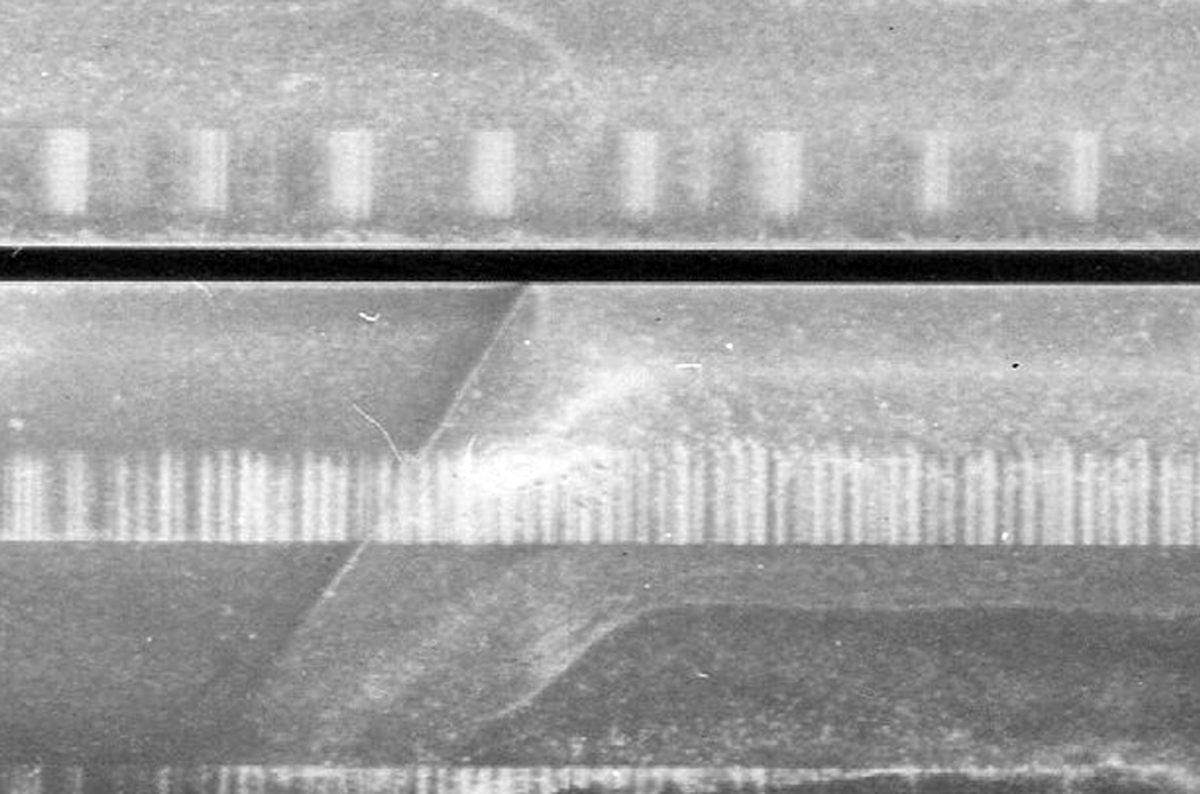
At this point I shd note that I knew nothing of the Phonoautograph at the time so this wasn't meant to be a historical reference. Given that Sound Poetry was still a somewhat new & controversial genre in Baltimore at the time, I was trying to create a review that was in the spirit of an analog to its experimentation, a Visual Poetry response to it (altho I wdn't've used such a description then - preferring then, as I do now, my own term: Concrete Essay).
But that was only the beginning. I made lip prints of Kirby & Marshall:
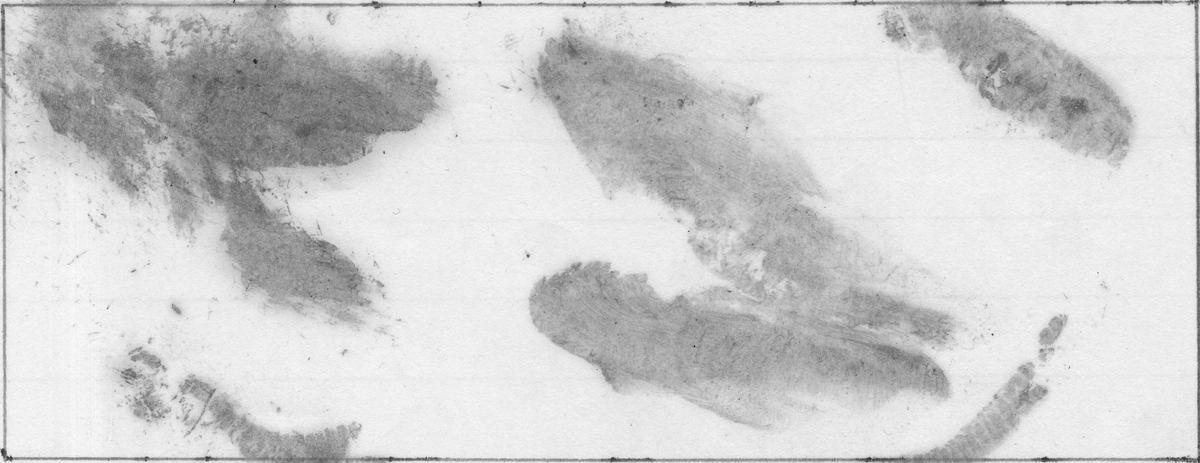
& incorporated a slew of relevant texts - many of them backwards. The amt of work it took to create this was far beyond the pale of a typical capsule review. Transparencies had to be made, etc.. Once this was all combined together into the 5" X 1&15/16" inch of my original the result was so delicate, detailed & complex that it wd've been hard for anyone w/o a magnifying glass to make much of it:
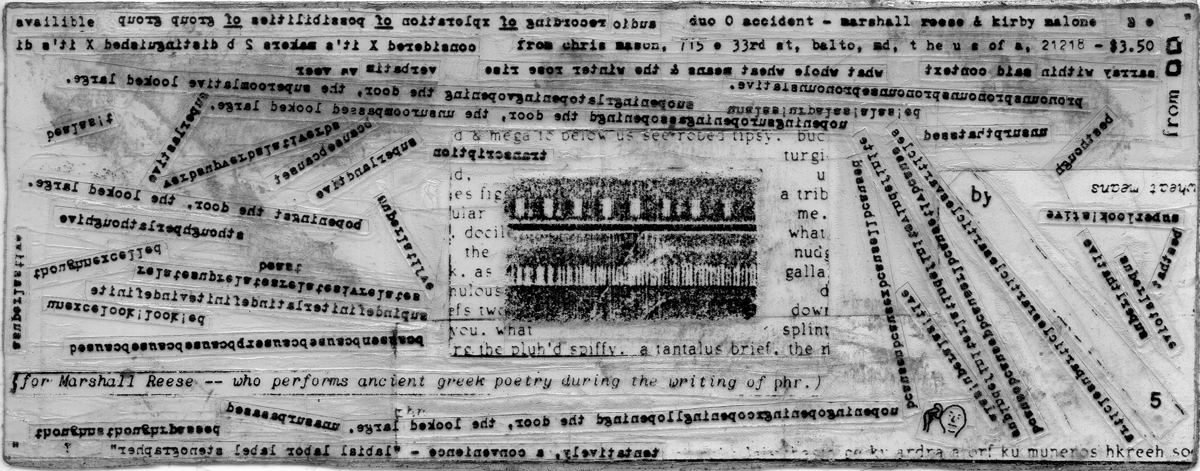
consider this detail enlargement:
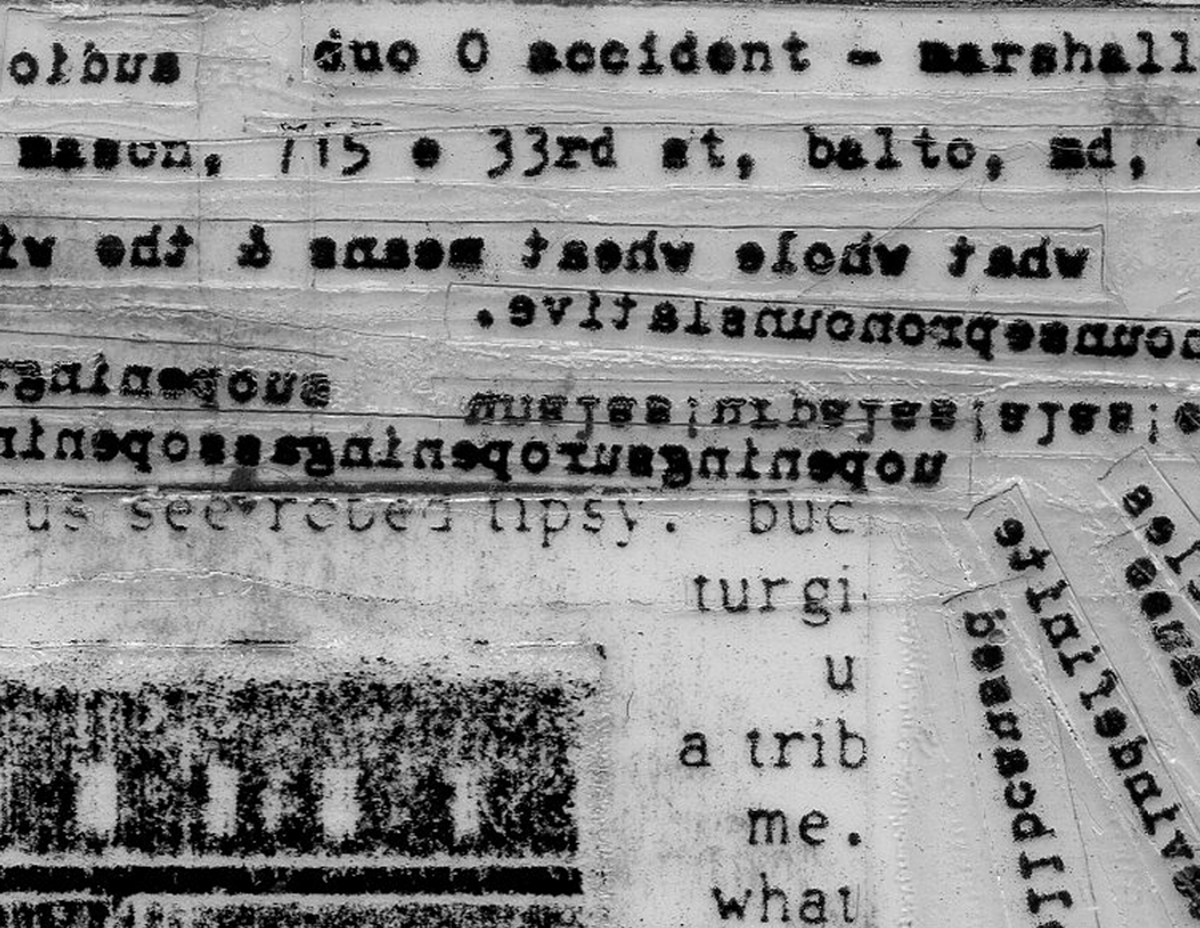
By the time it was printed under the "Views" section of the Maryland Writer's Council's mnthly mailing called "Hard Crabs", reduced even further to 4.25" & mimeographed in brown ink, it wd've been unlikely for most readers to've seen it as anything other than an illustration - despite its being flanked (&, thereby, somewhat contextualized) by more conventional reviews:
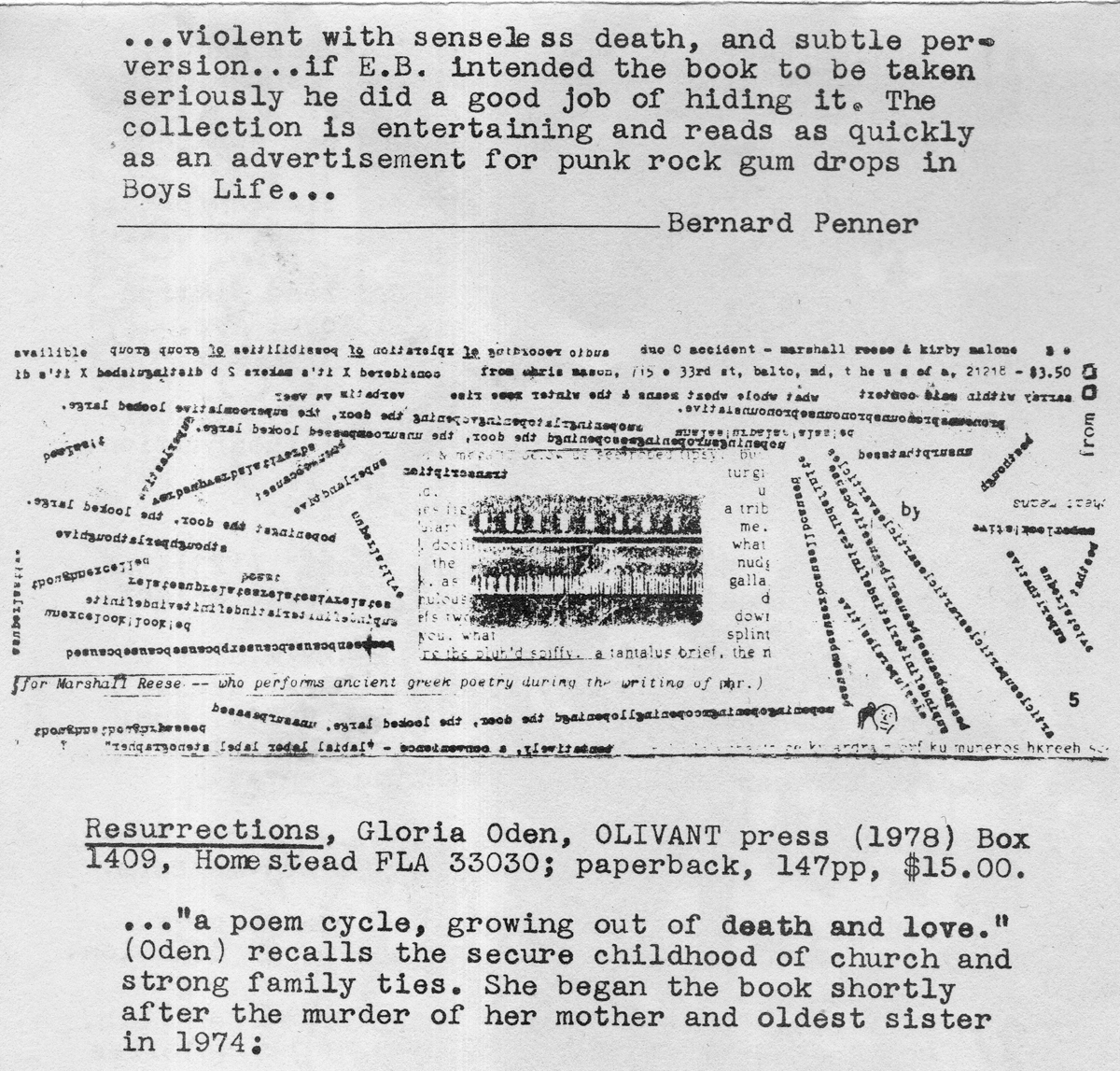
Regardless of the incredible conceptual opacity of this 'review', what we have here is a laboriously created & very 'original' work unlike anything I'd seen before or've seen since. & it used a tool that few poets wd've known about or been interested in - viz: electro-magnetic developer.
When technologies are developed they don't necessarily preserve every positive aspect of the predecessors that they may help make 'obsolete'. The purpose of the phonograph was to play back recordings - it wasn't to play them back AND make their visual analog available.
Things don't just become obsolete b/c they're completely improved upon (altho in some cases they may be). Capitalism has a primary motive of making money. More money can be made thru preplanned obsolescence than it can by making devices that approach immortality. If the pyramids had been made by contemporary capitalists, they wd've been made w/ tax-payer bail-outs & they'd be torn down 30 yrs later for an 'upgrade' - just like the stadiums are - & the CEOs wd've retired w/ tidy 200 million dollar packages - even if they were caught cooking the bks.
Qualities do get lost in transition - but that's of less interest to capitalists than that the buying public is convinced that the NEW is inevitably better. But is it really 'better' for people to transition to iPods? For saving space, yes; for getting high-quality audio w/ substantial supporting information & graphics: NO! So wch do you want? I want the information, I want to learn. Many people who listen to music on iPods probably barely know anything about the origins of that music: Who are the musicians? Who cares?!
Even during the best of times, audio tapes were severely marginalized. In the 1980s, a time that one might consider to be the heyday of Home Taping, tapes were rarely taken seriously. Why? B/c, as produced by individuals rather than big business, they didn't have mass manufacturing & distribution. What do you, personally, value more: a painting from a friend or a mass manufactured print?
The point is that the mass attitude seems to be that if something has money behind it it must be worth paying attn to & if it doesn't have money behind it it must be crap. Are there any other standards? A mass manufactured print made for the museum market is going to be of an acclaimed painting by an acclaimed painter. One of my favorite painters is Justen Ladda, I haven't come across a print by him yet.
It's all well & good to think: 'well, my friend's painting is crap & this print is of a great painting' - but what if people's actual mental subtext is more along these lines: 'my friend's painting must be crap b/c it hasn't been made into a mass market print'? In other words, what if the cultural receiver has no criteria to judge things by that're original to them? What if other people 'do their thinking for them'?! Good for capitalism, bad for human intelligence.
Even record labels that I consider to be important for various reasons often started off marginalized, & often stayed that way. Take, eg, academic classical labels like Louisville Orchestra First Edition Records: I have one that's in a plain red jacket w/ an informative piece of paper glued to the front. Is this home-made appearance crap? The record includes Gunther Schuller's "Dramatic Overture" & Toshiro Mayuzumi's "Samsara, Symphonic Poem". Are they crap? I hardly think so. & yet most people I know wd never consider buying such a record not only b/c they wdn't know the music (wch is unfortunate) but also b/c the cover looks too slap-dash.
I even have an early record on the Angel label that seems to be a multi-purpose jacket (cleverly designed to look somewhat like a burlap sack) w/ a sticker wrapped around its upper left corner w/ minimal info about what's inside. This LP includes pieces by 2 major Cuban composers: Amadeo Roldán & Alejandro Garcia Caturla. How many North Americans know their work? Do you think there's any anti-Cuba politics involved? (In addition to the usual apathy & ignorance, ie.) Angel went on to be better budgeted.
Punk has promoted the importance of thinking-for-one's-self & valuing the hand-made & then gone on to shoot itself in the foot by refusing to look & listen outside its own myopic ghetto. There's AfriClassical, why not PunkClassical? (Perhaps someone like Glen Branca wd qualify as an example) Or, as I say,: LOW CLASSICAL USIC?
WHAT I'M GETTING AT HERE IS THAT AUDIO TAPES ARE A PERFECTLY VALID MEDIUM. Just b/c CDs came along doesn't mean that K7s are no longer capable of recording music & spoken word & other sounds of genius. When I listen to a recording, I'm listening for its content - not for whether it's been backed by Mammon! (Altho that can be a part of its content)
I've always admired Folkways as my 'ideal' recordings publisher. Folkways issued records of things like Sounds of North American Frogs by Charles M. Bogert. Not exactly a big money-maker, I'm sure. But if big money-making were the only criteria for publishing, intellectual life wd go down the shit-hole. It's already being helped along the way w/ widely used computer programs like iTunes w/ its mind-numbingly limited vocabulary of "Song Name" & "Artist". Heck forbid that any musical unit be anything other than the song. Heck forbid that any creative individual or group be anything but the artist or the band. How low can we go?!
WdmU exists much more in the spirit of Folkways (altho, alas, w/ a much more limited budget & scope). There was a time when my partial goal in running it was to at least give a little more public exposure to BalTimOre musicians unlikely to get much attn outside of their working class ghetto. Back in what may've been the mid 1980s or early 1990s, I approached one B-More composer & offered to publish a tape by him. In his megalomaniacal delusions he told me that his 'work is so important that the big publishers will be picking it up' & rejected my offer. As of 2013, I know of no available recordings by him - even from his own website!
Even people that I've published give the label no respect. Chris Mason, eg, in the 32 yrs since I've been running WdmU, has only expressed interest in the 8 tapes he published. he's never once expressed interest in the other 90 or so. I've published something like 22 tapes w/ Neil on them &, yet, on his website he has this to say:
Chronological Discography:
[LP] Funny Music, Neil Feather, John Sheehan and Patrick Bowers (Wax Tracks, 1983)
MANY cassette releases on Widémouth tapes in various contexts
[LP] The Official Wafer Face Record, The Official Project (Wafer Face records)
[CD-R] Revelation of An Anaplumb, solo Anaplumb (Field Recordings, 1999)
[CD-R] The Hermenutic Ubermenschen ... Sing!--Former Guitar Duo, THUS [duo with John Berndt] (Field Recordings, 1999)
Upcoming CD Release Projects:
Folk Music Without People, 2 CD set with THUS
No Delays, CD premier of Aerotrain
The LPs & CDs (even the CD-Rs) are worthy of being listed separately but he doesn't bother to list the releases by name of the person who's supported his work the most. It's exasperating. The mindset of tape-dismissal runs deep.
Tapes & CD-Rs both can be made at home w/ very little money - so they both have that advantage. But wch medium will last the longest? People dismiss tapes as if they deteriorate w/in a matter of yrs. Do they? Consider the beginning of this widely disseminated article:
Audio recordings of U.S. history fading fast, study shows
by The Associated
"New digital recordings of events in U.S. history and early radio shows are at risk of being lost much faster than older ones on tape and many are already gone, according to a study on sound released Wednesday. The nation's first comprehensive study of the preservation of sound recordings in the United States shows new digital audio recordings are at greater risk of being lost than older recordings. The study also found major parts of the nation's heritage in recorded sound already have been lost or can't be accessed by the public.
"Even recent history - such as recordings from 9/11 or the 2008 election - is at risk because digital sound files can be corrupted and widely used CD-R discs [..] only last three to five years before files start to fade, said study co-author Sam Brylawski.
""I think we're assuming that if it's on the Web it's going to be there forever," he said. "That's one of the biggest challenges.""
[..]
"Digital files are a blessing and a curse. Sounds can be easily recorded and transferred and the files require less and less space. But the problem, Brylawski said, is they must be constantly maintained and backed up by audio experts as technology changes. That requires active preservation, rather than simply placing files on a shelf, he said.""
& how long do you think these mp3s & streaming videos are going to last? & who controls what information you have access to?
In my personal experience as a private archivist (& as a publisher, etc) w/ over 3 decades of experience & as a person who's done related work for at least one high-profile institution, I've noticed tapes last much longer than CDs. CDs are throwaway culture - & matters just keep getting worse. I'd rather have a $200 cassette duping deck that'll last 20 yrs than a CD burner in an $1,800 computer that might last 8 (if I'm lucky). AYE! & there's the rub! What's good for me (a cheap device capable of recording, playback & duplication that's long-lasting) is bad for capitalism (wch wd much rather sell me something that's expensive & short-lived that I'll have to buy updates for or new variations of from here-to-eternity).
I'm reminded of an acquaintance of mine from the early 1990s. He told me of his dislike of tapes & of how he saved everything to his computer. Yrs later I heard he lost it all in a hard-drive crash. At least 20 yrs later our conversation, I still have almost every tape recording I've ever made (& there's quite alot!) & they still play.
As I wrote in the program notes for an archive screening (& the packaging notes for a DVD-R that I publish of the same material) of selections from my archive-of-movies-from-friends:
"Of course, these day's, it's file-sharing thru computers & the internet that seems to be most important - & I'm all for it (sortof). But computers, though widely present, are STILL too expensive & controlled by pre-planned obsolescence - & the technical network too out of control of the user. Alas, I'll package this program as a DVD b/c almost no-one I know HAS a VCR anymore. Too bad.
"For those of us involved in such archiving it's not the 'celebrities' that're of interest. It's the people we know & can have personal relationships with. I'd rather live life fully with friends than vicariously thru the icons. Lifestyles of the Rich & Famous? How about Lifestyles of the Eccentric & Imaginative? Of the Intelligent & Visionary? Of the Friendly & Accessible? These may include the rich & famous but certainly aren't excluded to them. The importance of personal archives is that they represent a history that one has a more direct connection to, a history that one can vouch for thru direct experience. All the people whose work I'm presenting here are people I've had some sort of direct contact with - mostly friends. the emphasis is on the PERSONAL - not on the commercial. There's much more at stake here than making money."
Of course, there's the argument that all this preservation is an OCD waste of natural resources. Being conscious of this, for awhile I published bks under the imprint of "Destruction of the Environment for Almost Insignificant Personal Gain". Alas, people who think that computers are somehow magically using less natural resources b/c they enable us to upload to the seemingly ethereal iCloud are living in a fantasy world. The iCloud is just less in their control & more in the control of corporations.
So, please join me in my quest for sonic thinking that's somewhat off the (commercial) map. WdmU tapes are waiting for yr considered attn.
to write to us, for trading or dering, etc..:
idioideo at verizon dot net
to V.C. home page - to S.P.C.S.M.E.F home page - to N.A.A.M.C.P. home page
to Widémouth Tapes home page - to Widémouth Tapes Catalog - to Usic Essays home page